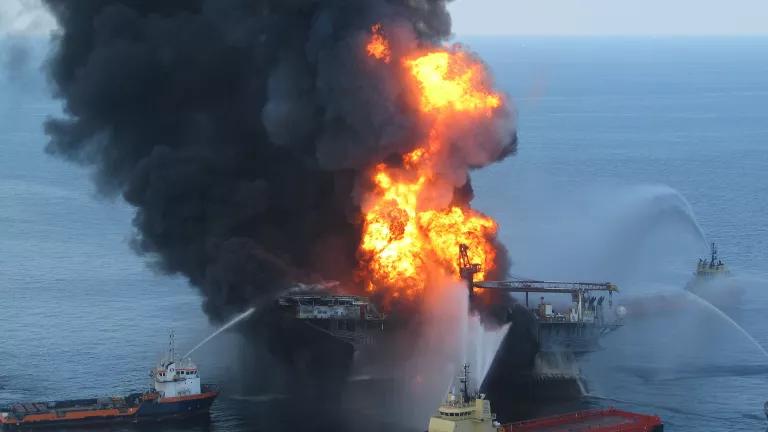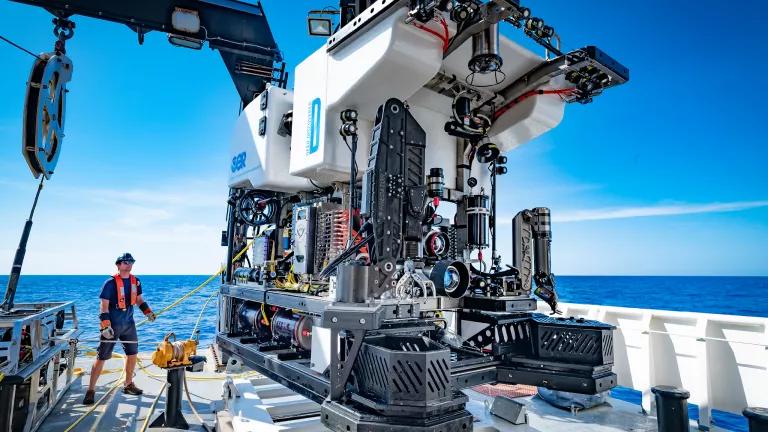This Monday in Atlantic City, U.S. Secretary of the Interior Ken Salazar kicks off a series of four regional public hearings to discuss the future of energy development off our coasts. This is the only hearing that will be held on the East Coast (other meetings will take place in New Orleans, San Francisco and Alaska).
"The purpose of these meetings is to have an open, honest conversation with the American people to solicit the best information possible about an offshore energy plan," Secretary Salazar recently stated.
And so, bright and early on Monday morning, I will be in Atlantic City to make sure the Administration hears NRDC's message that offshore drilling poses serious environmental and economic risks to our nation's coastline, and will only prolong our unhealthy and needless addiction to fossil fuel development.
Secretary Salazar will start the meetings by providing a brief overview of the survey of OCS energy resources that the agency released yesterday. Among other things, the survey revealed enormous potential for wind power off the Atlantic Coast. The remainder of the day, Interior Department staff will be listening to what America wants included in our nation's new comprehensive energy plan. Please join me in attending!
These hearings give everyone a chance to weigh in as the new Administration determines America's energy future and that of our country's beaches, shores, and Arctic resources.
President Obama has called on Congress to double our renewable energy supply in the next three years. And Secretary Salazar has indicated he is committed to developing the clean energy we need to repower America. Unfortunately, he has also indicated the U.S. is not done with offshore oil and gas drilling. We have to break this bad habit that will do nothing to significantly lower energy costs, but instead risks devastating our beaches, waves and the industries that rely on them (like our more than $12 billion commercial fishing and more than $116 billion ocean and coastal tourism and recreation industries). It's time to focus on new energy sources that can't spill, run out or harm public health.
I agree with President Obama that science should be the basis for our coastal policies. We must build on the Interior Department's recent survey by collecting more environmental baseline information and further documenting the impacts of leasing and development on ocean and coastal ecosystems before we move forward on important and long-lasting decisions about America's energy portfolio and the future of our ocean life.
I will be asking that the Administration:
- Not open up new offshore lands to oil and gas leasing, exploration, production, or development until the findings of two important assessments are made available: 1) An assessment by the National Academy of Sciences of current environmental baseline information and the impacts of leasing and development on ocean and coastal ecosystems. The independent NAS should review all relevant information, including from academic scientists, coastal states, and natural resource agencies such as the National Ocean and Atmospheric Administration (NOAA), and build on the Interior Department's recently released report. 2) An assessment by the Government Accounting Office (GAO) of the impacts of OCS leasing and development on the price and supply of oil and gas.
- Suspend new leasing and any drilling activities and seismic activities on existing leases in the Beaufort and Chukchi Seas on Alaska's Arctic coast until we have the necessary information to make sensible energy policy decisions. In the Beaufort and Chukchi Seas, there should be a "time out" on all oil and gas activities until an Arctic conservation and development plan is prepared by a presidentially appointed interagency task force. (Even routine exploration and drilling activities bring harm to many marine species. For example, seismic surveys designed to estimate the size of an oil and gas reserve use ships to tow multiple airgun arrays that emit high-decibel explosive impulses to map an area - the loudest human-generated noise in the oceans besides explosions. Fish and marine mammals that rely on their sense of sound to find mates, locate prey, avoid predators, and communicate suffer damage to their sensitive organs as a result. Seismic surveys have been implicated in numerous whale beaching and stranding incidents.)
- Ensure that offshore renewables are developed without jeopardizing the health of our already-stressed, valuable ocean systems. By using a marine spatial planning (MSP) process, the Department of the Interior can identify areas suitable for offshore renewable energy development and associated transmission lines. (MSP is the process of analyzing and allocating ocean space for specific uses in order to achieve specified ecological, economic, and social objectives.) Properly developed, a marine spatial plan could steer development towards those areas best suited to alternative energy projects, while protecting areas more vulnerable to serious environmental impacts. These plans should be developed in partnership with NOAA, and in coordination with willing states.
If you're interested in attending any of these historic hearings, more information can be found at: http://www.doi.gov/ocs/.




